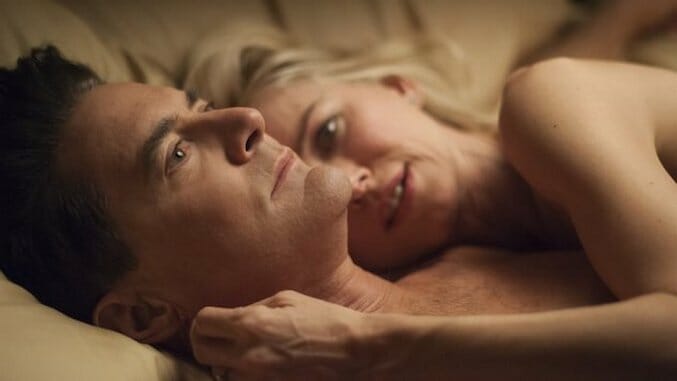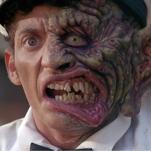The 10 Best Limited Series of 2017
Header image: Courtesy of Showtime
The proliferation of the limited series, the umbrella term for miniseries and anthologies, has been one of the defining features of “peak TV” (thanks, Ryan Murphy), but 2017 might be the first in which limited series truly dominated the TV conversation. Though it turned out not to be so “limited” after all, HBO’s Big Little Lies—which we decided to remove from this list after its Season Two pick-up—led the way, followed by Feud: Bette and Joan, Fargo and the conversation piece to end all conversation pieces, Twin Peaks: The Return. (Yes, it’s a continuation of an ongoing narrative, but Showtime is calling it a “limited event series,” so why not? It’s been a quarter century, after all.) Throw in two potent, timely broadcast programs, a magisterial treatment of The Vietnam War, a period Western, the year’s other Margaret Atwood adaptation, and a hybrid docudrama from one of our most celebrated filmmakers, and it’s hard not to see the limited series renaissance as one of the most fruitful recent developments in the history of the eighth art.
10. Wormwood
Network: Netflix

Documentary legend Errol Morris’ Netflix project is a lesson about the struggles of how much distrust we can still have for the very people we have to trust to get the answers. Clinical psychologist Eric Olson knows he shouldn’t believe the government, particularly when they come forward decades years later to explain some of the circumstances of his dad’s death. Yet, like Hamlet taking on Claudius in the Shakespeare play from which this miniseries gets its name, he must keep digging to avenge his dad lest he, himself, go mad. But what does this mean for the audience watching Eric’s story play out on screen? Morris has cast actors like Peter Sarsgaard and Christian Camargo to recreate scenes from the events depicted by the U.S. government that he, himself, doesn’t necessarily believe are true. So why are we to trust him? —Whitney Friedlander
9. Godless
Network: Netflix

Godless, Netflix’s amazeballs seven-part Western, takes place in the No Man’s Land of La Belle, New Mexico. Most of the town’s men have died in a catastrophic accident, and that’s pretty much OK with the ladies. Now, I need to digress for a moment and say that in times when gun violence is an especially freighted issue, there’s probably at least a master’s thesis to be had from a revival of the Western genre. There, I’ve got that on the record. Now: This show is the dictionary definition of “bingeable.”
I’ll spare you the plot and just say this seven-hour movie (which is what it essentially is) has a great cast (Wow, Merritt Wever! Just wow is all), including Sam Waterston, Kim Coates and Scott McNairy, and, as in many of the best Westerns, one of the principle characters is the landscape itself. This is one lavishly and beautifully shot vision of 1880s Santa Fe. I mean gorgeous. I mean like Howard Hawks would watch it and go “Yup.” If you love Westerns, this is definitely one to try. If you don’t, check it out anyway; it’s very likely to seduce you. —Amy Glynn
8. The Long Road Home
Network: National Geographic Channel

The Long Road Home, which concludes December 19, kicked off with a nail-biting episode about the April 2004 ambush of the 1st Calvary Division on a peace keeping mission in Sadr City, Baghdad. The eight-part limited series makes it abundantly clear that when you are a soldier in command there is no room for wavering. In the face of incredible danger and unimaginable circumstances, you must lead decisively and with conviction. When we talk of war and whether we should send troops, it is easy to forget that real people and their families are on the other end of that decision. It’s even easier to forget that peace keeping missions can be dangerous, too. With stand-out performances from Jason Ritter, E. J. Bonilla and Michael Kelly, The Long Road Home forces viewers not to forget and is an unflinching look at the terrors of war, the heroes war creates, and the sacrifices of all involved. —Amy Amatangelo
7. Shots Fired
Network:: FOX

Shots Fired could have been a compelling drama if it focused merely on the aftereffects of a police shooting. A narrative about the investigation into a police department, and the emotional impact on those forced to survive the tragedy of a child’s death, could have been plenty fascinating, and still unlike anything else on TV. But creators Gina Prince-Bythewood and Reggie Bythewood weren’t satisfied with “good enough,” and instead created a portrait of a city, through the lenses of police brutality, politics, education (and school segregation), motherhood and faith. Rather than merely bringing us a story about a black cop killing an unarmed white teenager, the Bythewoods invited us into a strange and often sorrowful web of drama in a small Southern town. Actors Stephan James, Helen Hunt, Aisha Hinds and Will Patton all deliver strong performances, but Sanaa Lathan, playing investigator Ashe Aikino, steals the show with the kind of complex, groundbreaking role that feminist TV-watchers dream of. Shots Fired presents itself as a timely series, and it’s true that the (still rising) number of black lives lost to police brutality—and especially Trayvon Martin—inspired its premise. But the show’s power lies in its depiction of not just a single problem—like policing in America—but of all the many issues and institutions that contribute to racial inequality in America. That such a series manages to be wildly entertaining as well is icing on the political-art cake. Shannon M. Houston
6. Fargo
Network: FX

The trick of creator Noah Hawley’s anthology series is that he finds a way to take his source material—Joel and Ethan Coen’s extremely smart movie about stupid criminals—and turn the dial to 11. The latest installment not only starred Ewan McGregor as grown twins still stuck in a biblical battle over birthright that started in their youth, but there were also themes on the death of the small business, failure in Hollywood and the idea of reincarnation. Oh, and let’s not forget Mary Elizabeth Winstead’s brilliantly named Nikki Swango and her ability to swiftly time the physics of a death by falling air conditioner. —Whitney Friedlander
5. Alias Grace
Network: Netflix

Adapted by Sarah Polley from Margaret Atwood’s historical novel, and directed by Mary Harron with forthright shudders of psychological horror, this sterling Canadian limited series is a tightly constructed marvel. In Canada in 1859, “celebrated murderess” Grace Marks (the brilliant Sarah Gadon) submits to an interview with Dr. Simon Jordan (Edward Holcroft), and their ongoing conversation unearths a pattern of violence and trauma, which Alias Grace spins into a scintillating mystery, an intricate biographical portrait, a lushly appointed period drama, and a ferocious treatment of the distance between what “the world at large” deigns to call harm and the countless ways men cause it. —Matt Brennan
4. American Crime
Network: ABC

People were rightly upset over the news, earlier this year, that HBO was planning an alternate-history Civil War-related drama with the Game of Thrones creators. But as New Yorker TV critic Emily Nussbaum pointed out on Twitter, if you want to watch a series about modern-day slavery in America, just watch the final season of creator John Ridley’s anthology. From the nameless migrant workers forced into the indentured servitude of picking the fruits and vegetables pretty much everyone in America eats to the child sex trafficking that happens beneath our noses as we feign innocence, American Crime reminds us that we—no matter our race or income—are all culpable to a degree, whether or not we want to admit it. —Whitney Friedlander
3. Feud: Bette and Joan
Network: FX

American Crime Story and now Feud have proven that auteur Ryan Murphy is at his best when he has a short, concise story to tell. And so Murphy’s examination of the long-running rift between Joan Crawford (Jessica Lange) and Bette Davis (Susan Sarandon) was more than just an examination of their experience filming Whatever Happened to Baby Jane?: It’s also a condemnation of an industry that abused them and cast them aside and what happens when your self-worth is completely tied to your public persona. We could debate for weeks whether Lange or Sarandon gave the better performance. I say let’s call it a draw, because both women had career highs with this series. Jackie Hoffman had a breakout performance as Crawford’s maid, Mamacita (I would so watch the story re-told from her perspective). Aided by strong performances from Stanley Tucci, Judy Davis, Alfred Molina, Alison Wright and Kiernan Shipka, with just the right amount of camp and Pepsi thrown in, we wanted to be friends with Feud the whole time. —Amy Amatangelo
2. The Vietnam War
Network: PBS

In the spring of 1975, after the strains of “White Christmas” signaled the conclusion of the United States’ foolhardy sojourn in Southeast Asia, the CIA’s Saigon station chief, Thomas Polgar, composed his final wire to Washington. “It has been a long fight, and we have lost,” he wrote, as allies clamored for space in the chaotic evacuation and American servicemen sent helicopters toppling into the sea. “Those who fail to learn from history are forced to repeat it. Let us hope that we will not have another Vietnam experience, and that we have learned our lesson.” These are old saws, of course, so oft repeated as to demand a certain skepticism, but in PBS’ 10-part, 18-hour examination of that long, lost fight, appearing at a moment in which the past’s dread echoes cannot be ignored, old saws cut deep. Indeed, it is by marshaling the familiar images and frequent phrases of that tumultuous era into a single, stricken epic that The Vietnam War becomes the most thorough screen treatment of the conflict since its ignominious end, and perhaps the definitive one: What it lacks in the immediacy of Emile de Antonio’s In the Year of the Pig, the Winterfilm Collective’s Winter Soldier, Peter Davis’ Hearts and Minds, and the thousands of hours of ghastly footage that Americans watched from the dinner table in the 1960s and 1970s, Ken Burns and Lynn Novick’s indispensable docuseries regains from the sheer grandeur of its portrait, and from its plaintive understanding that the war was the hinge on which the optimism of “the American century” swung firmly, irrevocably shut. —Matt Brennan
1. Twin Peaks: The Return
Network: Showtime

Twenty-seven years after David Lynch changed the face of television with a whodunit/whydunit about a murdered homecoming queen, he created an extraordinary 18-episode sequel. The Return wasn’t merely a return: It ranged from Las Vegas to New York to 1940s Los Alamos, N.M. before bringing Special Agent Dale Cooper (the incandescent Kyle MacLachlan) home to the land of Douglas firs and dubious owls. Lynch’s master preoccupations hit as hard as ever: violence against women, metaphysics and the supernatural, nostalgic pop music, and the ways in which good and evil are at once mundane and unfathomably mysterious (television itself gets a bit of a meta-referendum, as it did the first time around). Featuring much of the original cast (including the last performances of Catherine Coulson and Miguel Ferrer) with a host of fabulous newcomers, Twin Peaks: The Return is sometimes a hoot and sometimes an utter tour de force, but always, always, classic David Lynch, which is to say, completely dedicated to the mystery. —Amy Glynn







































